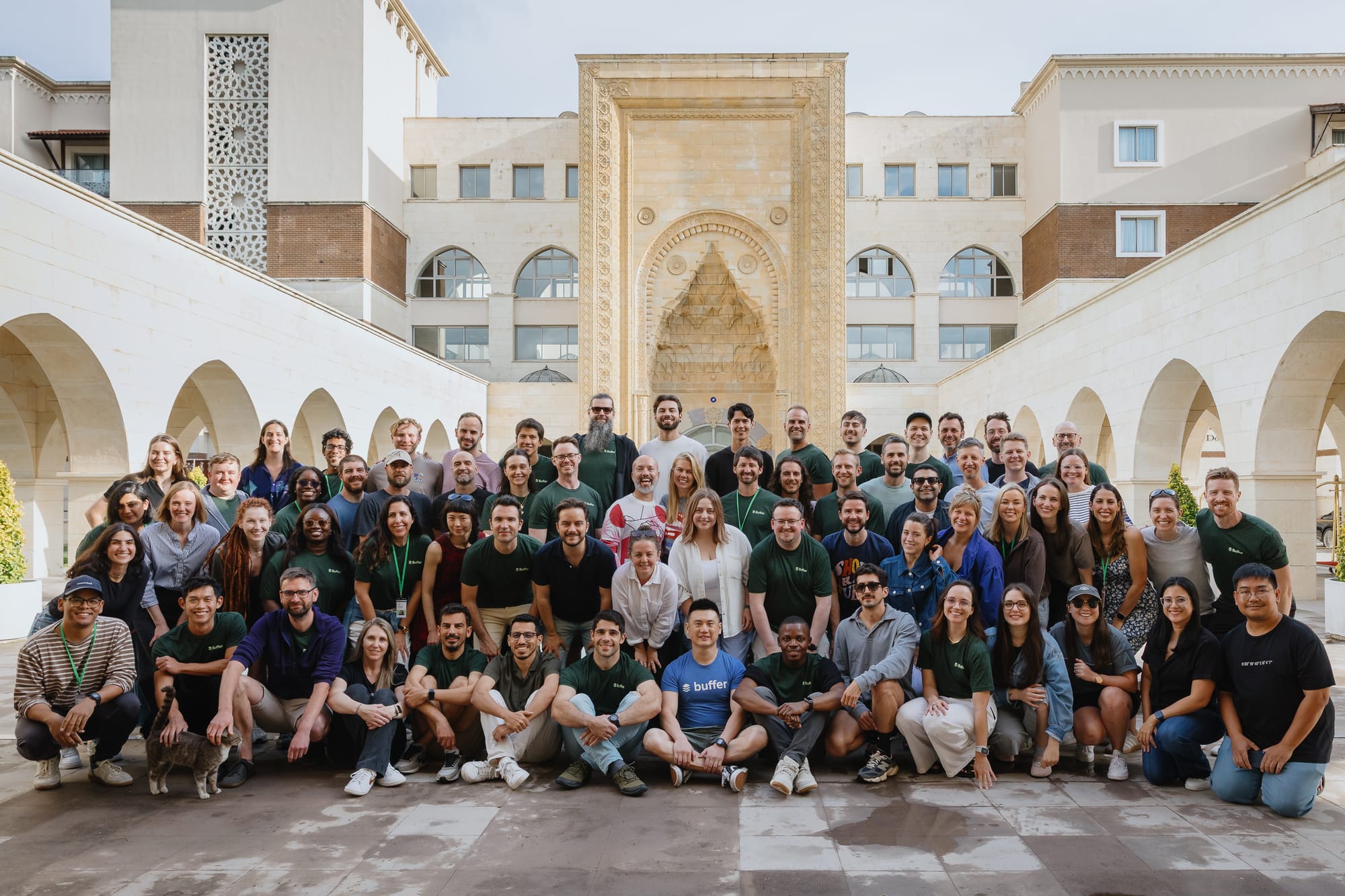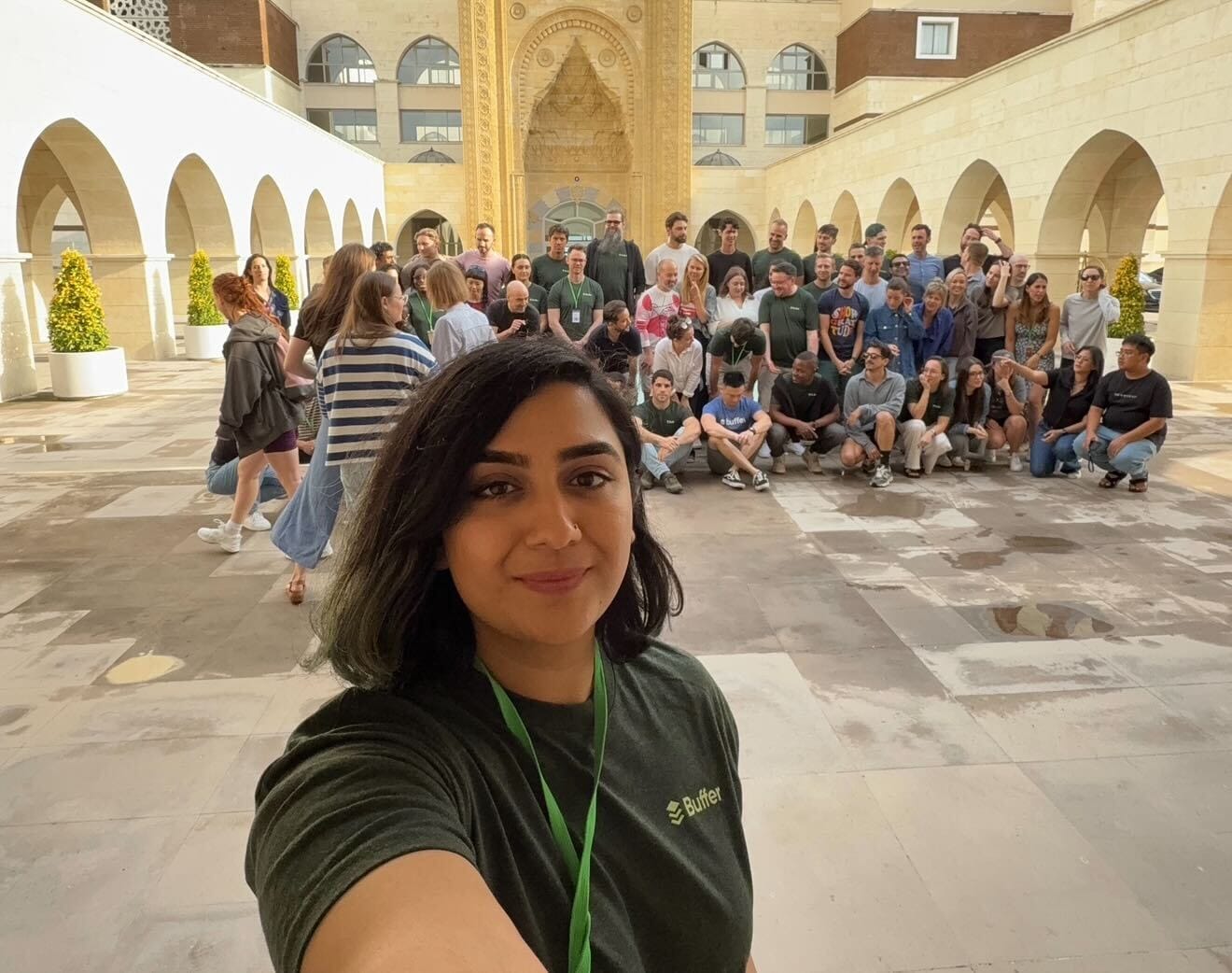
An Honest Look into our Engineering Team Engagement Survey
In the spring of 2021, we put out an engagement survey to our engineering team to understand their experience at Buffer. In this post, we share the very honest and eye-opening survey results, and the action steps we plan to take from our learnings.
VP of Engineering @ Buffer
It’s been a busy season for our engineering, product, and design teams at Buffer — what we collectively refer to as EPD. In the past eight months alone, we hired a Chief Product Officer for the first time, promoted a team member to be our first VP of Design, completely overhauled and restructured how we organize our EPD teams, created new roles on the team and hired 10 new product and engineering team members to our now 48-person EPD area.
That’s a lot of change. Thus, in the spring of 2021, we put out a survey to the EPD teams to understand the level of engagement of our team members and our “eNPS” — employee NPS, or if team members would recommend Buffer as a place to work.
I did a deep dive into the experience of the engineering team in particular – the results were an honest, eye-opening look into the experience of our team members, and we have a lot of action steps to take from our learnings.
A few key takeaways:
- Engineering teammates have very distinct and differing needs depending on their tenure at Buffer (6+ years, 2-6 years, less than 2 years).
- Women on the engineering team have a much lower eNPS than their male counterparts.
Below, we’d love to share the survey results transparently through the note I shared with our team.
Hi team,
Thanks so much for completing the EPD Engagement survey. Here's the breakdown for us in engineering:
Engagement is quite high, and eNPS at 38 is ok. About half of you actively recommend Buffer as a place to work, half feel it’s kind of ok, and a couple of people actively do not recommend Buffer.

If we break it down, a few more interesting things emerge:
Breakdown by tenure
Veterans: 6+ years at Buffer

Veterans feel most committed to the company (100%), positive about coworkers (100%), and feel they belong here (100%) but don’t see themselves really growing in their careers anymore (29%).
This makes sense: only people who like their coworkers and company would stay over six years, and also, at that time frame, managers need to work harder to find career growth opportunities.
So the focus for this group is career growth, and that’s the main driver of going from “it’s ok” to “it’s great here.” This honestly does get harder as time goes on — to keep a growth curve after many years — and so we need to get more creative with these conversations. With Lattice reviews and growth plans happening now, that’s one way to think about what’s next for veteran teammates.
Tenured Teammates: 2-6 years at Buffer

Teammates who have been here 2-6 years are our largest group. Engagement & eNPS are the same as the all-engineering average, and this includes some people who actively don’t recommend Buffer as a place to work.
This group is happiest with Management (94%) and Team Culture (94%) but is also the most exhausted group. Only 38% of this group have energy for leisure, friends, and family after work. They also don’t feel that this hard work is noticed: only 44% of respondents say people notice that they are going the extra mile (or hundred miles).
For this group, work-life balance and managing workload is the main focus, with burnout and not feeling valued as the main concerns. This is an active focus for me and for engineering managers who have been hearing this, too.
Newer Teammates: Less than 2 years at Buffer

Teammates with less than two years at Buffer are by far the happiest. Again, nobody in this group actively thinks Buffer engineering is a bad place to work. I’m happy to see this because it means that our outside image, and who we are on the inside, aren’t hugely different (if we talked a big game during recruitment and the blogs but were horrible to work at, we’d see eNPS of new people be lower with many detractors).
This group scored every metric as 100% (seriously!) except for feeling valued, at 67%.
For this group, recognition of contributions, praise, and valuing their opinion is the most important thing to improve. We hear you!
Breakdown by Gender
Gender is one factor where people can have very different experiences at the same workplace. There are other factors too, but we don’t have data for those. We do have enough people to have data, which is great. What’s not great is that women in engineering have a very different and much worse experience than men.
Note: all respondents happened to identify within the gender binary as either “male” or “female,” so I only have two categories represented for gender. That said, there are many genders.
Men in Engineering

Women in Engineering

Obviously, this is a problem. I would rather have a team with an eNPS of 20 and all genders scoring “it’s ok here” than have some genders saying it’s “good to great” and other genders saying that “it’s just ok” or “it’s awful.”
It’s also notable that participation in the survey from women in engineering was a bit low. This means that an eNPS of 0 is probably over-estimated. People who don’t fill in the survey are not usually super happy. More likely, the non-respondents are either passive or negative (“it’s fine, and I don’t have time for surveys” or “it’s so horrible and hopeless that there’s no point in even filling in a survey”).
There is some good news: at least some women are saying it’s great to work here! Also, women rated Management at 100% (we have 50% women engineering managers, so that could be part of it), and they rated Team Culture at 100%: women think their coworkers are skilled and do quality work.
Job Satisfaction at 80% is good, and so is Fit & Belonging (80%). So the good news is that women don’t feel actively excluded, held back, and discriminated against. That’s a low bar, but it’s one many teams fail to clear.
For women, Work Relationships was one of the lowest scores. While “my supervisor cares about me” and “my coworkers want me to succeed” is at 100%, “people know what’s happening in my life” is at just 20%. Women don’t feel comfortable talking about what’s going on for them outside of work.
Women are also more exhausted than average, with just 40% having energy for other things outside work.
One hypothesis or story here is that the pandemic has been extra hard on working moms, and women still pull a double shift in many cases. There’s also often a stigma around being a working mom or caring for parents and relatives, and so women feel exhausted and also unable to talk about everything draining them at and outside of work. Women are socialized to smile, be nice, don’t complain, have it all together, and face a lot of guilt and pressure to be always on, always “doing it all.” This is true in society at large. So, it could be true of our women in engineering, and a problem if Buffer isn’t doing enough to support them.
Another interesting data point: women scored lower than average for trust in senior leadership’s decisions, with no “strong agrees” and a few “disagrees.” Recently, I read a post on Being Glue that offers a possible explanation here:
Women are socialized to be nurturers and often pick up extra work to shield their team members from decisions made in leadership that could be challenging for others to adapt to. Recent org chart changes come to mind; there could be other factors too. If women statistically feel the impact and are tired from trying to mitigate that impact, while men are more likely to feel the benefit of that Glue/nurturing work without as many costs, that could explain some of the differences between men and women’s experiences. That’s a hypothesis. It’s a story I could tell from the data I have on this team and from the data in the industry. I don’t know whether that is our story.
To find out more about what the story (stories?) really is, Melissa [our new VP of People] and I are going to run a session with women in engineering to hear more about the experience of being a women engineer at Buffer and why it is different — and worse — than the experience of being a man in engineering.
For men reading this, you are absolutely welcome to share your thoughts with Melissa or me directly. If you’ve noticed anything that would negatively affect your women coworkers, I absolutely want to hear about it, and if you have ideas, please share.
The reason I’m not including men in that live discussion is that I want to hear the women’s stories from the women because, in the data, we see that the story for women is different. I hope this makes sense. I am happy to talk more about it too.
Limitations
I don’t have enough data on race and sexual orientation to have statistically significant sample sizes, so I can’t draw any conclusions for these groups as part of this survey. We do know that these groups also can have a harder time in the industry at large.
In the long run, a more diverse team will mean more data. In the shorter run, we’ll need to rely on other methods to ensure everyone has an equitable experience. There is work to be done, and not having it in survey results does not erase that work.
-Katie
As we continue to make changes and improvements to the engineering experience at Buffer, we look forward to sharing our learnings along the way.
Feel free to reach out to me on Twitter at @gokatiewilde to continue the conversation about building engaged and fulfilled engineering teams. Always happy to chat!
Try Buffer for free
180,000+ creators, small businesses, and marketers use Buffer to grow their audiences every month.
Related Articles

We've been hosting Retreats at Buffer for 12+ years. In this article, we've detailed everything we've learned from 14 Retreats.

I recently attended my first in-person, international conference. Here's what I learned.

What it was like to join a fully remote team like Buffer, and how going on the company retreat so early on helped shape my journey in ways I hadn’t imagined.